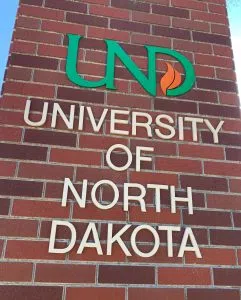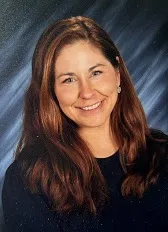North Dakota
Fargo officer killed in ambush remembered as ‘brave young man’

Jake Wallin was once a small boy who sought comfort in the arms of family, terrified of fireworks that lit up the sky. On Saturday, the Fargo police officer was remembered for growing up to be a military veteran and dedicated officer whose “final act of valor” was staring down the face of a man intent on bloodshed.
Wallin, 23, was killed July 14 when a man armed with 1,800 rounds of ammunition, multiple guns and explosives ambushed officers responding to a routine traffic crash. Two other officers and a civilian were wounded before a fourth officer returned fire, killing gunman Mohamad Barakat. Police said the actions of the fourth officer likely spared the city a bigger, bloodier attack.
Wallin, who had been sworn in as a Fargo police officer in April and was still in field training, was cremated in his uniform. On Saturday, the Fargo Police Department escorted his cremains to Pequot Lakes, Minnesota, for his funeral service, which was attended by loved ones, dignitaries and law enforcement agencies from across the country.
The man who fired on police officers in North Dakota earlier this month chose to use a gun that was modified with a binary trigger.
The North Dakota attorney general said Friday that the gunman used a weapon that allowed him to fire rapidly during the July 14 attack.
Authorities in North Dakota say a man armed with 1,800 rounds of ammunition and explosives unleashed a “murderous barrage of fire” as he ambushed officers who were investigating a crash.
Funeral services have been set for the Fargo, North Dakota, police officer killed in a shooting that also left two other officers injured.
The police procession of 10 squad cars and three buses carrying department employees left Fargo early Saturday for Pequot Lakes. Dozens of people were at the memorial honoring Wallin at the site of the shooting as the procession went past, KFGO reported.
Wallin previously served in the Minnesota Army National Guard and was deployed to Afghanistan and Iraq from November 2020 to July 2021, according to a spokesperson for the Minnesota National Guard.
He received final military honors at a private interment.
“He served his country, came back here and wanted nothing more but to serve in a position with purpose and meaning — his exact words — and he did that,” Fargo Police Chief David Zibolski said at a media briefing after the shooting.
Zibolski on Saturday recounted Wallin’s impressive quality as a candidate in his officer interview last fall, how he excelled in the police academy, and strived for a job with meaning and purpose.
The chief shared that body-camera footage of the shooting showed Wallin “hurried to create distance, intuitively” after his fellow officers were hit, pulled his gun out and was taking aim at the gunman when he was fatally struck.
“His final act of valor was to selflessly face the shooter and attempt to neutralize him to save others,” Zibolski said. “His actions were valorous and exemplify the highest standards of the policing profession.”
Aunt Jodi Wallin recounted her nephew as “the little boy I adored who grew into the young man I admired and was oh so proud of.”
Wallin had recently purchased a house for himself and his fiancée, and “was so proud of becoming a new homeowner that he ran right out and bought himself a lawnmower and mowed his new lawn,” his aunt said.
“I remember him as a small boy with his little arms wrapped so tightly around my neck, burying his face into me to try to avoid the fireworks that he hated so much at that age,” she said. “From that timid, small boy, he grew to be a driven, ambitious, brave young man.”
Chaplain Jordan Helming, who served with Wallin in Iraq, recalled his dedication as a soldier and his positive personality amid a changing mission as well as restrictions of the coronavirus pandemic.
“Jake could see the big picture in life, and he realized that it took long, disciplined, steady efforts to get you to the top of the mountain,” Helming said.
Wallin’s parents received two Fargo police awards and the Minnesota Distinguished Service Medal in honor of their son at the service.
Law enforcement agencies from other states attended Wallin’s funeral. A caravan including Sioux Falls police and South Dakota Highway Patrol left Sioux Falls, South Dakota, on Friday to make the five-and-a-half hour trip for the funeral, KELO-TV reported.
Dignitaries at the funeral service included Minnesota Gov. Tim Walz and U.S. Sen. Amy Klobuchar.
A public memorial service is planned for Wednesday in Fargo. North Dakota Gov. Doug Burgum will attend and give remarks, his spokesman said.
On Friday, North Dakota Attorney General Drew Wrigley provided more details about the attack, which also wounded Officers Andrew Dotas and Tyler Hawes and bystander Karlee Koswick, who had been involved in the crash.
Barakat was a Syrian national who came to the U.S. on an asylum request in 2012 and became a U.S. citizen in 2019, Wrigley said.
Over the past five years, he had searched the internet for terms including “kill fast,” “explosive ammo,” “incendiary rounds,” and “mass shooting events,” Wrigley said.
Perhaps the most chilling search was for “area events where there are crowds,” which on July 13 brought up a news article with the headline, “Thousands enjoy first day of Downtown Fargo Street Fair.” On the day of the attack, the downtown fair was in its second day and was less than 3 miles (5 kilometers) from the crash scene.
Barakat also searched for information on the Red River Valley Fair, which was a 6-mile (10-kilometer) drive from the scene, the attorney general said.
Wrigley said Barakat had an “obvious motive to kill” and was driven by hate, but it was not directed toward any particular group — including the police.
Evidence suggests instead that Barakat came upon the crash by “happenstance” and his ensuing ambush was a diversion from his much bigger intended target, Wrigley said.

North Dakota
Enrollment up nearly 4% at North Dakota public colleges, universities

BISMARCK, N.D. (Jeff Beach/North Dakota Monitor) – Fall enrollment at North Dakota University System campuses is up nearly 4%, the highest enrollment recorded since 2014.
The 11 public colleges and universities have 47,522 students, according to figures released Wednesday. The system’s record enrollment was in 2011 at 48,883.
Williston State College saw the highest percentage growth in headcount with 11%, while North Dakota State College of Science reported a 9% enrollment jump, Bismarck State College reported an 8% increase and Mayville State University reported 7% growth.
The University of North Dakota, which leads the state in enrollment, saw a 5% increase and is at an all-time high with 15,844 students.
UND President Andy Armacost said the university has seen strong growth in new students the past two years.
“We’re grateful to be able to impact a large number of students with the great programs at UND,” Armacost said.
Bismarck State College’s enrollment of 4,549 students also was a record.
“Seven straight semesters of growth show that our polytechnic mission is not only resonating but making a real difference for students and the industries we serve,” Interim President Dan Leingang said in a statement.
North Dakota State University has recorded the exact same fall headcount for the past three years at 11,952 students. NDSU showed a 3% increase in first-year students, alongside a significant rise in new international undergraduate students, according to a news release from the university.
NDSU has 95% of students enrolled in in-person programs, the highest number across the entire North Dakota University System, the release said.
NSDU President David Cook, who is in his third year on the job, appeared remotely before a North Dakota legislative committee Wednesday.
“We have stabilized enrollment at NDSU, and I think we’re creating the right foundation for where we want to be,” Cook said.
Minot State University President Steve Shirley, in a Tuesday presentation to the State Board of Higher Education, said that while headcount at the school is flat, there is a 3% increase in full-time equivalent students that he said reflects a “nice little bump” in freshman enrollment — about a 15% increase.
“We’re excited about that,” he said.
Dickinson State University was the only school to show an enrollment decline, down 3%.
Dakota College at Bottineau had 3% enrollment growth. Lake Region State College and Valley City State University each reported 1% increases.
North Dakota
Board approves Brent Sanford as new ‘commissioner’ of North Dakota University System

MINOT — The board overseeing the North Dakota University System has awarded the interim chancellor the permanent role and changed the name of that role in the process.
The State Board of Higher Education unanimously approved Brent Sanford as commissioner of the system at its meeting Tuesday, Sept. 23, in Minot.
Sanford, a former Republican lieutenant governor, was
named the interim university system leader in April,
replacing Chancellor Mark Hagerott,
who stepped down around the same time.
In August, Board Chair Kevin Black told a legislative committee meeting in Dickinson that
he favored skipping a nationwide search in favor of giving Sanford the job.
Before the vote Tuesday, Black called it a “once-in-a-generational opportunity” to appoint Sanford, whom he said can make a true difference for higher education.
“For those reasons, I think doing the right thing and putting the right person in the seat trumps the process. In this case, I think it is absolutely 100% worth it,” Black said.
Other board members praised Sanford, indicating he was an obvious choice.
“I can always recognize the guy that’s got that ‘it factor,’ and in my opinion, Brent’s got that ‘it factor,’ and I’m excited about his opportunities to come and lead this university system,” said Member Tim Mihalick.
Said Member Danita Bye, “We could have done a national search and Brent would be our top candidate.”
Black said despite changing the title to commissioner, a motion that also received unanimous approval, the role of the position does not change.
“What I think the board is really saying through this motion is that we believe it’s important to align with what the Constitution says and what Century Code says,” he said.
To reflect the change, Board Vice Chair Donald “D.J.” Campbell laid out further amendments to other leadership titles.
The chancellor will become commissioner, the vice chancellor for academic and student affairs will become deputy commissioner/chief academic and student affairs officer, and the vice chancellor for administrative affairs will become deputy commissioner and chief financial officer, he said.
Before the vote on Sanford took place, he gave a presentation to the board and answered questions from board members.
Member Patrick Sogard asked about
a perception among some in the public
of Sanford’s lack of experience in academia.
Hagerott, who had led the university system since 2015, had a doctorate degree, and other recent chancellors have had master’s or other advanced degrees.
Sanford said his experience interacting with higher education as lieutenant governor was valuable.
He added that he was truly enjoying the role as interim chancellor.
“You can probably tell I do and I find it a better fit than I thought it would be, because it’s turning out that this job is very much a government leadership, government administrator, political administrator, type job that I’m used to,” Sanford said.
Also slated to be discussed Tuesday was
consideration of a policy change stating presidential vacancies at colleges and universities may be filled without doing a search.
North Dakota
One Up for the North Dakota Teacher’s of the Year is From the Grand Forks District

Emily Dawes. (Photo provided by the North Dakota Department of Public Instruction)
(KNOX) – A literacy specialist for grades kindergarten through fifth at Lake Agassiz Elementary School in the Grand Forks District, Emily Dawes is one of four finalists for North Dakota Teacher of the Year.
“I somehow was nominated. I hope it was a reflection of me as a teacher. So than I was chosen from a committee, so a committee chose me.” Dawes told KNOX News in an interview.
Dawes was a teacher at J. Nelson Kelly Elementary School when she was named as a contender for teacher of the year.
“I was at Kelly Elementary and I was happily teaching first grade and I absolutely loved every moment of it. But this opportunity to be a literary specialist came my way,” said Dawes.
The winner will be named in ceremony on September 26th in Bismarck.
-

 Finance5 days ago
Finance5 days agoReimagining Finance: Derek Kudsee on Coda’s AI-Powered Future
-

 Business1 week ago
Business1 week agoHow Nexstar’s Proposed TV Merger Is Tied to Jimmy Kimmel’s Suspension
-
North Dakota5 days ago
Board approves Brent Sanford as new ‘commissioner’ of North Dakota University System
-
World1 week ago
Russian jets enter Estonia's airspace in latest test for NATO
-

 Crypto4 days ago
Crypto4 days agoTexas brothers charged in cryptocurrency kidnapping, robbery in MN
-

 World4 days ago
World4 days agoSyria’s new president takes center stage at UNGA as concerns linger over terrorist past
-

 Technology4 days ago
Technology4 days agoThese earbuds include a tiny wired microphone you can hold
-

 Crypto5 days ago
Crypto5 days agoEU Enforcers Arrest 5 Over €100M Cryptocurrency Scam – Law360
















